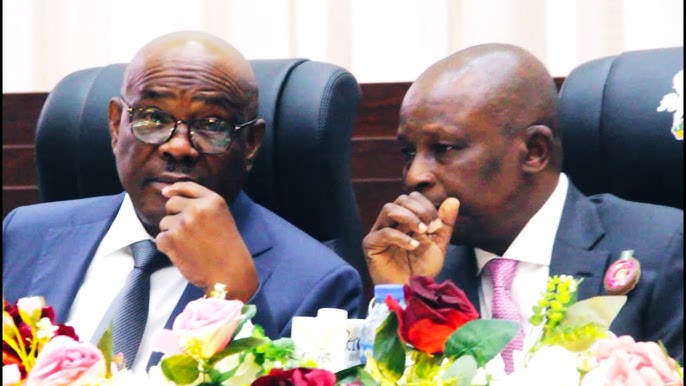As commercial sex workers in the Federal Capital Territory (FCT) failed in their bid to legitimize prostitution in the country through the law court, the lower legislative chamber of the National Assembly has equally risen against pornographic sites providers, calling on the Nigerian Communication Commission (NCC) to close the sites to avoid corrupting impressionable young Nigerians
By Udoka Ekeleme, Abuja
Wednesday, March 12, 2025 is a day the commercial sex worker in the country can never forget in a hurry. The prostitutes operating in the nation’s capital, Abuja had decided to try their luck to legalize their immoral and age-long outlawed trade, but failed. On the said day, a Federal High Court sitting in Abuja, had declined to legalize and legitimize prostitution as an occupation in the country. The Court had dismissed a suit filed by Abuja-based prostitutes that sought to enforce fundamental rights of commercial sex workers in the Federal Capital Territory (FCT).
The court, in a judgment delivered by Justice James Omotosho, while describing prostitution as an immoral act that is alien to cultural values of all the ethnic groups in the country, said it found no reason to stop the Minister of the FCT, Nyesom Wike, and security agencies, from arresting those that engage in such illicit business.
According to the court, prostitutes have no legal rights to enjoy under any known law or the Constitution of the Federal Republic of Nigeria, 1999 (as amended).

The judgement followed a suit marked: FHC/ABJ/CS/642/2024, which the sex workers filed to bar the FCT Minister and the Abuja Environmental Protection Board (AEPB), from harassing, intimidating, arresting and prosecuting them.
Also, other respondents in the suit that was initiated on behalf of Abuja-based prostitutes, by a Non-Governmental Organization under the aegis of Lawyers Alert Initiative for Protection of Rights of Children, Women and Indigent, were the Federal Capital Territory Administration (FCTA), and Attorney-General of the Federation (AGF).
Through their team of lawyers led by Mr. Rommy Mom, the sex workers had prayed the court to enforce their right to prostitution, in line with all the fundamental human rights that inure to them from the 1999 Constitution, as amended.
Specifically, they urged the court to determine whether the duties of the AEPB under Section 6 of the AEPB Act, 1997, extends to the harassment, arrest, detention and prosecution of women suspected of engaging in sex work on the streets of Abuja.
As well as, whether by the provision of Section 35 (1) (d) of the AEPB Act, 1997, women can be regarded as articles or their bodies regarded as goods for purchase.
Upon the determination of the questions, the applicants sought a declaration that a charge the AEPB entered before the FCT Mobile Court, which referred to arrested women suspected of engaging in sex work as “articles” and considered their bodies as “goods for purchase,” was discriminatory and a violation of Section 42 of the 1999 Constitution.
The prostitutes further sought a declaration that the duties of the board does not extend to the harassment, arrest and raid of women suspected of engaging in sex work on the streets of Abuja.
A declaration that neither Section 6 of the AEPB Act, 1997, nor any extant laws of the country, authorized the board to arrest women suspected of engaging in sex work on the streets of Abuja.
The applicants also prayed the court to restrain the AEPB, its agents or privies, from harassing, arresting and raiding women suspected of engaging in sex work on the streets of Abuja.
And also to make an order, directing all the respondents to ensure proper application of the provisions of Abuja Environmental Protect Act, 1997, by the 1st respondent, AEPB.
In his judgement, Justice Omotosho held that under the criminal law also known as the Penal Code, commercial sex workers are liable to be arrested and prosecuted for a jail term of two years.
Justice Omotosho held that their application was incompetent as it did not fall within the confines of the Fundamental Rights (Enforcement Procedure) Rules, 2009.
The court further posited that the reliefs sought by the applicants were not grantable, even as it dismissed the case for want of merit.
Justice Omotosho said: “This court wonders what kind of message the applicant is sending when it decided to bring an action to protect prostitutes.
“A reasonable person would have expected that the applicant would instead occupy itself with developing the girl child and protecting the sanctity of womanhood instead of promoting immorality and the spread of sexual diseases. It is indeed shameful that the applicant should file an action such as this.
“The women suspected of engaging in sex work on the streets of Abuja or prostitutes or vagabonds are by their actions committing an offence and thus their fundamental rights can be legally breached by the 1st respondent.
“Holding a different opinion would mean that a person arrested in the process of robbing others can claim to be entitled to his fundamental rights to personal liberty and freedom.
“This would cause anarchy and chaos in the society. Assuming that prostitution is not an offence in the FCT, the rights of these prostitutes can legally be violated under Section 45 of the constitution which allows the breach of a person’s right on grounds of defence, public safety, public health, public order and public morality.
“It is a known fact that prostitutes are some of the clearest examples of indecency in the society and they are champions of immorality through their immoral dressing, exposing sensitive parts of their bodies, their use of vulgar language as well as the chief culprits in spreading sexual diseases.
“Allowing prostitutes to have free reign on the streets of Abuja will, in no time, destroy the moral fibre of the city and turn it to a hotbed of immorality.
“This court will not allow such to happen,” he said adding that the court was not unaware that prostitution had been legalised in some western nations, including in the Netherlands where prostitutes are now entitled to pensions and other benefits.
“This is not so in Africa. The African Charter on Human and People’s Rights which is one of the Statutes enforced by the Fundamental Rights (Enforcement Procedure) Rules, is clear on what fundamental rights are in Africa.”
He held that looking at the preamble to the charter, the culture of Africans must reflect in their idea of what constitutes human rights.
“This philosophy is what is known as cultural relativism in the framework of human rights.
“The counterpoint to this is universality, which posits that human rights should be the same in all places and should apply to persons irrespective of their culture, religion, race, gender or other differences.
“The idea behind universalism is to ensure uniformity in human rights development. Universality of human rights directly led to the drafting of the Universal Declaration of Human Rights which is the first global human rights document.
“While it is theoretically sound, universalism if applied would offend the unique cultures of some people.
“For instance, the right to same sex marriage, which is acceptable in Western nations like the United Kingdom will be deeply unacceptable to conservative and religious nations like Arab nations.
“Thus cultural relativism means that these nations can choose which of these rights to adopt or not.
It’s alien to our culture
“This explains why some conservative nations exercise their right to reservation regarding several sections of the Universal Declaration of Human Rights which are in conflict with their cultural beliefs.
“I daresay that prostitution is alien and has never been part of our culture. Prostitution or ‘Olosho’ and ‘Ashewo’ as the Yorubas call it, ‘Akwuna-Akwuna’ as the Igbos call it, ‘Karuwa’ as the Hausas call it or ‘Hookup’ as the young people say it, is alien to our culture.
“It has been frowned upon as a deeply immoral act worthy of shame.The fact that civilisation and westernisation has taken some root in Nigeria still does not make it right. Even in some Western countries, prostitution is still seen as an immoral act.
“In the United States of America for instance, apart from a few counties in the state of Nevada, prostitution or sex work is illegal in the other 50 states of the US.
“There is absolutely no justification for prostitution in Nigeria in the context of our cultural norms and tradition and in fact prostitution is an anathema in Africa.”
Justice Omotosho held that prostitutes, which the group sought to protect “are vagabonds” and the AEPB is well within its right to arrest and prosecute them as they constitute nuisance in the FCT and are clearly committing an offence by parading themselves as “women of easy virtue.
“I therefore hold that this application filed by the applicant has no basis and the rights claimed are unenforceable in light of the provisions of Section 45 of the Constitution of the Federal Republic of Nigeria 1999 (as amended) and the Preamble to the African Charter on Human and Peoples Rights,” the trial judge added.
Rattled by the increasing level of immorality in the country in the recent times, especially among Nigerian youths and teenagers, the House of Representatives has ordered the Nigerian Communications Commission (NCC) to enforce the immediate shutdown of pornographic websites nationwide.
The directive was issued during plenary on Tuesday, March 11, 2025 following a motion sponsored by Dalhatu Tafoki, a member representing Faskari/Kankara/Sabuwa Federal Constituency of Katsina State.
The motion sought to block access to pornographic content in the country, citing concerns over societal values and psychological effects.
Honourable Tafoki said, “I rise to move a motion for the need to block internet website hosting pornographic content and sanction defaulting internet service providers. The House notes that cyber pornography is fast becoming a global problem and no concrete steps have been taken to cover the phenomenon of cyber pornography in Nigeria.”
He further argued that Nigeria, being a religious country, prohibits nudity and obscenity in any form. He noted that several countries in Asia, Africa, and the Middle East have already enacted laws banning pornography.
The House directed the NCC to block pornographic websites and enforce strict penalties on non-compliant internet service providers.
“Urge the Nigerian Communications Commission, NCC, to direct internet service providers operating in the country to take immediate steps to block all websites that host obscene and pornographic content.
Also urge the Nigerian Communications Commission to apply the full rigours of the Nigerian Communications Act and the National Information Technology Development Act against defaulting internet service providers,” Tafoki Also added.
Tafoki highlighted expert concerns about the psychological and sociological effects of pornography.
He said, “Renowned psychologists and sociologists around the world have issued stern warnings that there are psychological and sociological consequences for creating pornographic content.”
Outlining the effects of pornography, including promoting promiscuity, addiction, desensitization, and altered family dynamics, the lawmaker said, “Confirm deeply that some of the immediate effects of viewing pornography contents include A. Causing deception in marriage, and which may later on affect family life. B. Promoting adultery, prostitution, and many other expectations that can result in dangerous promiscuous behaviour. C. Leading to addiction, escalation, desensitisation, and the acting out sexually by one person. D. Change of attitude towards oneself and his family.”
Subsequently, the House adopted the motion and mandated its Committees on Communications and Legislative Compliance to ensure implementation. The committees are expected to report back within four weeks for further legislative action.
The Speaker of the House, Tajudeen Abbas, reiterated the lawmakers’ stance, stating that sanctions would be imposed on internet service providers that fail to comply with the directive.




